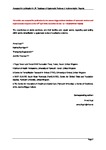The experiences of stroke survivors, and their families and unpaid carers, regarding goal setting within stroke rehabilitation: a systematic review of qualitative evidence.
| dc.contributor.author | Lloyd, A | |
| dc.contributor.author | Bannigan, Katrina | |
| dc.contributor.author | Sugavanam, T | |
| dc.contributor.author | Freeman, Jennifer | |
| dc.date.accessioned | 2018-04-30T20:09:22Z | |
| dc.date.issued | 2018-06 | |
| dc.identifier.issn | 2202-4433 | |
| dc.identifier.issn | 2202-4433 | |
| dc.identifier.uri | http://hdl.handle.net/10026.1/11381 | |
| dc.description.abstract |
<jats:title>ABSTRACT</jats:title> <jats:sec> <jats:title>Objective:</jats:title> <jats:p>The objective of the review was to synthesize the best available qualitative evidence regarding the experiences of stroke survivors, their families and unpaid carers, about goal setting within stroke rehabilitation.</jats:p> </jats:sec> <jats:sec> <jats:title>Introduction:</jats:title> <jats:p>Clinical guidelines recommend person-centered goal setting in stroke rehabilitation but many barriers exist to its implementation. Individual differences and preferences, of both the stroke survivor and practitioner, may influence involvement in goal setting. A stroke survivor's relationship with close family members and unpaid carers can be powerful and could influence rehabilitation, recovery and goal setting.</jats:p> </jats:sec> <jats:sec> <jats:title>Inclusion criteria:</jats:title> <jats:p>The participants of interest were adults (over 18 years) who had experienced a stroke and undergone rehabilitation, and their families and unpaid carers. The phenomena of interest were the experiences of goal setting within stroke rehabilitation for stroke survivors, their families and unpaid carers. The context was stroke rehabilitation in acute and community hospitals, inpatient rehabilitation units and the community. Studies considered for this review were qualitative primary research studies and the qualitative portion of mixed methods research.</jats:p> </jats:sec> <jats:sec> <jats:title>Methods:</jats:title> <jats:p>A three-step search strategy was used to identify English language qualitative primary research studies (both published and unpublished) through November 2017. Two reviewers independently appraised the included studies using the Joanna Briggs Institute (JBI) Critical Appraisal Checklist for Qualitative Research. Studies were included if they achieved 50% “yes” results for the methodological assessment. Data were extracted from the included papers using the standardized JBI qualitative data extraction tool. Data were synthesized using meta-aggregation.</jats:p> </jats:sec> <jats:sec> <jats:title>Results:</jats:title> <jats:p>Four studies were included in this review, from which 44 findings were extracted. These were aggregated into 12 categories and four synthesized findings: (1) Person-centered goal setting is possible but often does not occur; (2) Practitioners shape the context of goal setting; (3) Practitioners need to listen to the person and know “who they are” – there is a need for an individualized approach to goal setting; (4) Recovery is ongoing and unpredictable. No findings reporting the experiences of goal setting from the perspective of family or unpaid carers were found, therefore all findings represent stroke survivor experiences. The role of goal setting in self-management could not be extracted from the data.</jats:p> </jats:sec> <jats:sec> <jats:title>Conclusions:</jats:title> <jats:p>Person-centered goal setting within stroke rehabilitation is both possible and rewarding but often does not occur. Goal setting contributes to the post-stroke rehabilitation experience and can be positively or negatively influenced by practitioners. Maintaining hope and a sense of forward momentum in recovery after stroke is perceived by stroke survivors as important and could be supported using goal setting that is tailored to the individual's needs and preferences. Future research should focus on refining individualized methods of goal setting in stroke rehabilitation and the role of the practitioner in this, including what skills are needed and how they can be acquired. The identified gaps in the literature about family members’ and unpaid carers’ experiences, and the role of goal setting in self-management, warrant further research.</jats:p> </jats:sec> | |
| dc.format.extent | 1418-1453 | |
| dc.format.medium | ||
| dc.language | en | |
| dc.language.iso | en | |
| dc.publisher | Ovid Technologies (Wolters Kluwer Health) | |
| dc.subject | Caregivers | |
| dc.subject | Goals | |
| dc.subject | Humans | |
| dc.subject | Inpatients | |
| dc.subject | Qualitative Research | |
| dc.subject | Stroke Rehabilitation | |
| dc.subject | Survivors | |
| dc.title | The experiences of stroke survivors, and their families and unpaid carers, regarding goal setting within stroke rehabilitation: a systematic review of qualitative evidence. | |
| dc.type | journal-article | |
| dc.type | Journal Article | |
| dc.type | Research Support, Non-U.S. Gov't | |
| dc.type | Systematic Review | |
| plymouth.author-url | https://www.ncbi.nlm.nih.gov/pubmed/29894410 | |
| plymouth.issue | 6 | |
| plymouth.volume | 16 | |
| plymouth.publication-status | Published | |
| plymouth.journal | Joanna Briggs Institute Database of Systematic Reviews and Implementation Reports | |
| dc.identifier.doi | 10.11124/JBISRIR-2017-003499 | |
| plymouth.organisational-group | /Plymouth | |
| plymouth.organisational-group | /Plymouth/Faculty of Health | |
| plymouth.organisational-group | /Plymouth/Faculty of Health/School of Health Professions | |
| plymouth.organisational-group | /Plymouth/REF 2021 Researchers by UoA | |
| plymouth.organisational-group | /Plymouth/REF 2021 Researchers by UoA/UoA03 Allied Health Professions, Dentistry, Nursing and Pharmacy | |
| plymouth.organisational-group | /Plymouth/Research Groups | |
| plymouth.organisational-group | /Plymouth/Research Groups/Institute of Health and Community | |
| plymouth.organisational-group | /Plymouth/Research Groups/Plymouth Institute of Health and Care Research (PIHR) | |
| plymouth.organisational-group | /Plymouth/Users by role | |
| plymouth.organisational-group | /Plymouth/Users by role/Academics | |
| plymouth.organisational-group | /Plymouth/Users by role/Researchers in ResearchFish submission | |
| dc.publisher.place | Australia | |
| dcterms.dateAccepted | 2018-04-13 | |
| dc.rights.embargodate | 2019-6-1 | |
| dc.identifier.eissn | 2202-4433 | |
| dc.rights.embargoperiod | 12 months | |
| rioxxterms.versionofrecord | 10.11124/JBISRIR-2017-003499 | |
| rioxxterms.licenseref.uri | http://www.rioxx.net/licenses/under-embargo-all-rights-reserved | |
| rioxxterms.licenseref.startdate | 2018-06 | |
| rioxxterms.type | Journal Article/Review |


